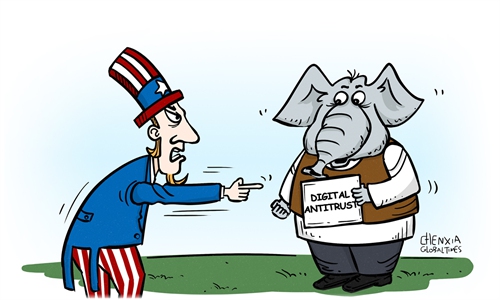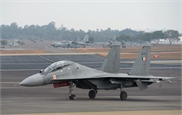Indians rating US as a ‘security risk’ indicates India will not be a loyal supporter

Illustration: Chen Xia/GT
According to a survey released on Tuesday by Morning Consult, a US-based global business intelligence company, 22 percent of the 1,000 Indian respondents rated the US as the second-most significant security risk, topping Pakistan.Based on the results, it is evident that not a few Indians have low or even no trust in the US.
This is also exemplified in that the combined share who blame the US (26 percent) or NATO (18 percent) for the current conflict in Ukraine in this survey is larger than those who blame Russia (38 percent).
In the past years, it seems that the US-India relations are warming up. Still, many Indians have increasingly become aware that Washington is, most of the time, the biggest culprit of the chaos and crises all over the world. They have also started to sense Washington's actual intentions behind its wooing of New Delhi: The US is making India serve its strategic interests.
India's mistrust in the US is real. It mainly comes from the fact that what Washington has promised to New Delhi has turned out to be lip service. The US claims that it attaches great importance to India on matters in which India has a tremendous air of expectancy, such as market access issues. Yet, Washington has been reluctant to grant what India hopes for.
Washington will not terminate its efforts to rope in New Delhi in various fields such as strategy, diplomacy, and security. Against the backdrop that the US has already regarded China as its top rival, the US wants to further sow discord between China and India by provoking friction between them. In this way, India can support the US' strategy, playing a more significant role in containing China. That is to say, as long as Washington sees Beijing as its top opponent, it will not stop attempts to woo India.
Nevertheless, India should not be viewed as a loyal supporter of the US, or a force that blindly follows the US. Judging from the country's foreign policy orientation since the Russia-Ukraine conflict, India has withstood waves of pressure from the US and the West, insisting on maintaining a neutral position in the Ukraine crisis.
New Delhi has kept a relatively large extent of its strategic autonomy and adopted policies based on the need to safeguard its own national interests. As India acts as an emerging power with growing self-confidence, it is impossible to expect New Delhi to be completely incorporated into the system dominated by Washington.
Over the years, the international community has clearly seen that the US is fighting not for the so-called rules, nor the democracy and human rights that it boasts. Instead, the US' fundamental goal is to maintain its hegemonic position in the world.
In the eyes of the US, the rise of a powerful country is the greatest threat to it. What has happened to China today will surely happen to the next country with growing comprehensive strength, such as India.
In short, as long as Washington is obsessed with maintaining its dominance over others in the world, with the rise of New Delhi in the future, India could see similar US suppression as the US is doing with China.
The author is director of the research department at the National Strategy Institute at Tsinghua University. opinion@globaltimes.com.cn


